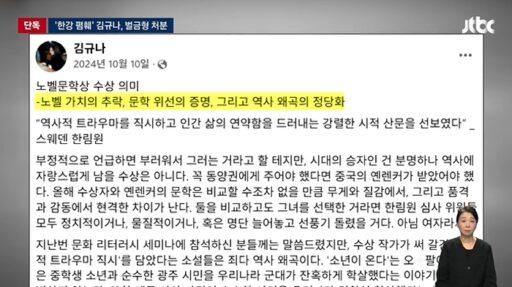Han Kang's Controversial Comments Following Nobel Prize Win
Following Han Kang's achievement as the first Korean and Asian woman to win the Nobel Prize in Literature, novelist Kim Gyuna has sparked controversy by posting comments that belittle the Gwangju Uprising.
Last October, immediately after Han Kang received the Nobel Prize, Kim took to social media to express that it represented "the decline of Nobel values, proof of literary hypocrisy, and justification of historical distortion," thereby undermining the significance of the award. Furthermore, she went on to assert that "(the May 18 incident) was a violent rebellion by individuals of unknown identity against which soldiers sacrificed their lives to protect the nation and its people."
Civil Group's Complaint Leads to Prosecutorial Charges

In response to these remarks, a civil organization reported Kim Gyuna for violating the Special Act on the May 18th Gwangju Democratization Movement.
The group stated, "The Special Act explicitly stipulates the punishment of those who distort history," adding that "Kim Gyuna's actions constitute a serious crime that undermines the spirit of democratization." The case was forwarded to the prosecution in March, and Kim countered by posting again, saying, "If one doesn't face a complaint from them, one isn't a patriot."
100,000 Won Fine Imposed… Notice of Formal Trial
According to JTBC on the 16th, the Seoul Central District Prosecutor's Office decided on the 13th to impose a summary indictment against Kim, with a fine of 100,000 Won.
However, Kim has expressed her intent to contest this and file for a formal trial.

Meanwhile, the controversy that arose shortly after Han Kang highlighted the significance of the Gwangju Uprising to the international community through her work "The Boy is Coming" has reignited social debate about the extent to which distortions and hate speech regarding the democratization movement should be tolerated.
Image source: News1, JTBC


